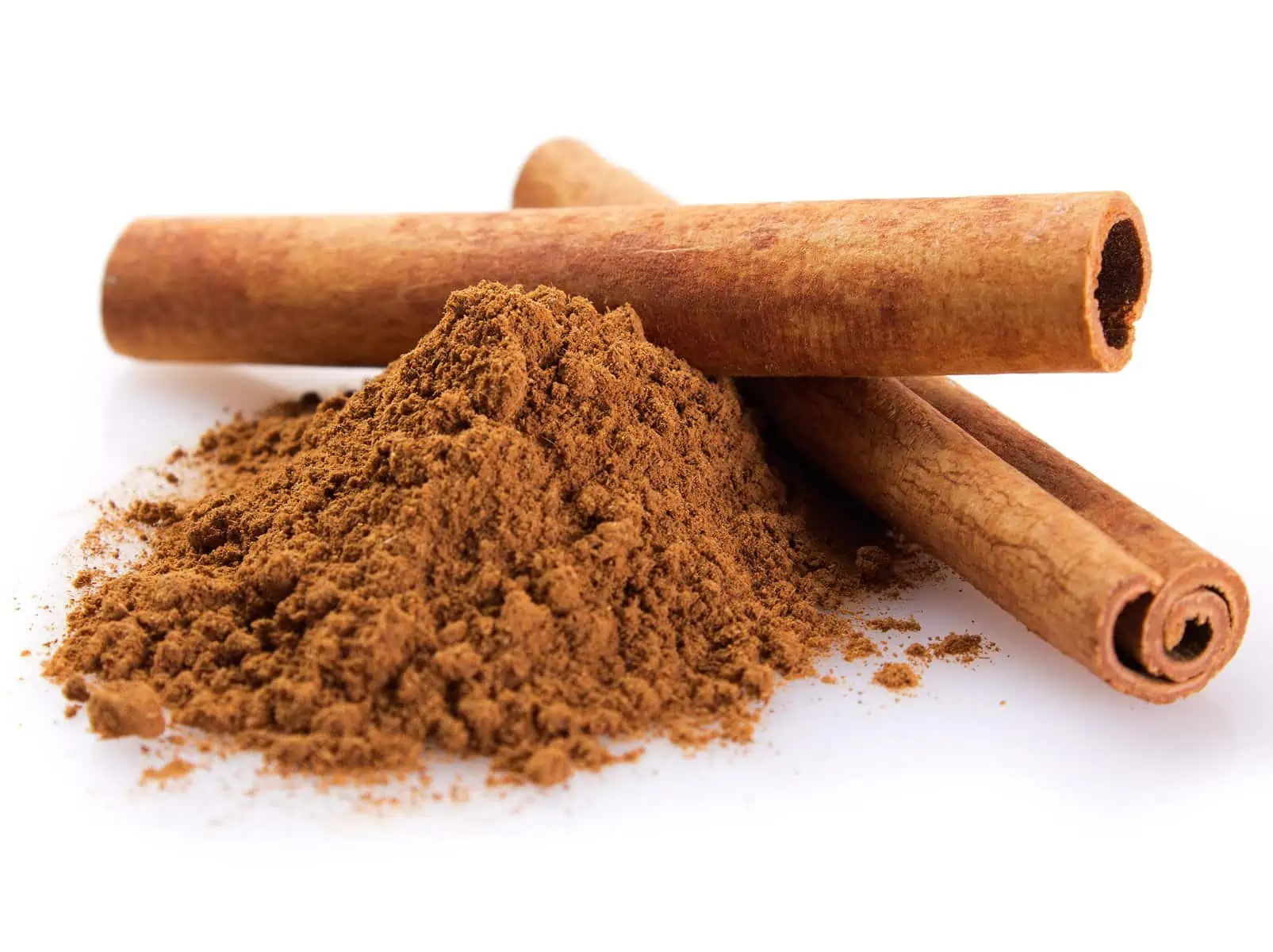The Wellness Wonders of Cinnamon
Derived from the bark of cinnamon trees, this ancient spice has been used for centuries not only as a flavour enhancer but also for its numerous health benefits. But did you know that there are two main types of cinnamon, each with its unique properties? In this blog post, we’ll uncover the health benefits of cinnamon, delving into its nutritional profile, impact on blood sugar management, heart health, antioxidant and anti-inflammatory properties, and its potential role in brain health. Get ready to be amazed by the wonders of this multifaceted medicinal plant!
Key Takeaways
- Cinnamon is a nutrient-rich spice that may offer health benefits such as improved blood sugar management, heart health protection, and brain health promotion.
- Cinnamon has antioxidant and anti-inflammatory properties to contribute to overall wellbeing.
- Learn tips for adding cinnamon to your diet with recipes for enjoying its unique flavour.
Cinnamon: Exploring the Two Main Types
Cinnamon comes in two main varieties: Cassia and Ceylon. Cassia cinnamon, the more common type, is characterised by its stronger flavour, lower price, and higher coumarin content. On the other hand, Ceylon cinnamon, also known as true cinnamon, boasts a milder flavour, is more expensive, and contains significantly lower coumarin content.
While Cassia cinnamon is generally safe for most individuals to consume in moderation, excessive consumption or taking cinnamon supplements containing Cassia could pose risks, particularly for:
- children
- those with liver disease
- those with gastroparesis
Conversely, Ceylon cinnamon, which can be found in specialty stores and online retailers, contains negligible amounts of coumarin and may also offer protection against certain cancers.

The Nutritional Profile of Cinnamon
Cinnamon is a nutrient-rich spice, packed with compounds like polyphenols, antioxidants, cinnamaldehyde, cinnamic acid, and cinnamate. These compounds contribute to the numerous health benefits of cinnamon, such as blood sugar control, protection against heart disease, and reduction of inflammation. This makes it helpful in weight loss and digestive health.
Cinnamon is an excellent addition to a healthy diet due to its nutritional profile and potential health benefits.
Cinnamon's Impact on Blood Sugar Management
Cinnamon has a significant impact on blood sugar regulation. It increases insulin sensitivity and reduces insulin resistance thereby aiding in blood sugar management and helping to lower blood sugar levels.
Studies indicate a potential reduction in insulin resistance and blood pressure through cinnamon consumption. Consuming as small an amount as half a teaspoon of cinnamon powder daily can be beneficial for keeping blood sugar levels in check and helping to reduce blood sugar levels as well as reduce blood pressure. Research has found that it can positively affect glucose levels in the body.
Various forms of cinnamon, derived from the cinnamon tree, include:
- pure bark
- ground spice
- cinnamon oil (essential oils)
- extracts
make it easy and enjoyable to add this spice to your diet. Adding cinnamon to savoury dishes can impart a subtle complexity and warmth to the flavour.
Cinnamon and Heart Health
Cinnamon has been linked to numerous potential heart health benefits. Studies have found that it may reduce risk factors associated with heart disease, such as triglycerides, cholesterol, and blood pressure. Its abundant antioxidants and anti-inflammatory compounds help protect against diseases and support overall health.
Increased doses of cinnamon have been shown to be highly advantageous in terms of reducing the risk of:
- heart disease
- diabetes
- cancer
- neurodegenerative diseases
Adding cinnamon to your daily diet could potentially enhance and promote heart health.
Antioxidant and Anti-Inflammatory Properties of Cinnamon
Cinnamon, rich in antioxidants and anti-inflammatory compounds, aids in disease prevention and overall health support. Polyphenols found in cinnamon are responsible for many of its health benefits, as well as its role as a preservative in food preparation.
Cinnamon’s anti-inflammatory effects are attributed to its antioxidant compounds. A study showed that cinnamon supplementation could notably augment antioxidant levels in the blood while abating markers employed to gauge inflammation, such as C-reactive protein.
With its potential health benefits in blood sugar control, protection against heart disease, and reduction of inflammation, cinnamon is an excellent addition to a healthy lifestyle.
This spice can help mitigate symptoms of indigestion, bloating, and discomfort, potentially reducing inflammation in the digestive tract and promoting a healthy gut environment.
Cinnamon's Role in Brain Health
Cinnamon may enhance brain function and guard against the emergence of neurological disorders, such as Parkinson’s and Alzheimer’s disease. Research has demonstrated that cinnamon can protect neurons from oxidative stress, thereby decreasing the likelihood of inflammation and cell damage in animal models.
Cinnamon has been observed to have the following benefits:
- Impedes the accumulation of a protein called tau in the brain, which is associated with Alzheimer’s disease
- Provides protection to neurons in mice with Parkinson’s disease
- Normalises neurotransmitter levels
- Enhances motor function
Regular inclusion of cinnamon in your diet could offer protective effects on brain health and lower the risk of neurological disorders.
Adding Cinnamon to Your Diet: Tips and Recipes
Adding cinnamon to your diet can be an enjoyable experience with an assortment of recipes and diverse forms such as:
- Pure bark
- Ground spice
- Essential oils
- Extracts
Cinnamon sticks can be used to flavour dishes during cooking and then discarded, while ground cinnamon can be incorporated into foods or scattered on baked goods, desserts, savoury dishes, and beverages. Cinnamon extract can also be utilised sparingly to add flavour.
Not only does cinnamon add a unique taste to your meals, but it also offers potential benefits to your skin due to its antibiotic and antimicrobial properties, which may provide protection against irritation, rashes, allergic reactions, and infection.
Explore various healthy recipes that include cinnamon to effortlessly incorporate this nutrient-rich spice into your daily diet and reap its numerous health benefits.
I love having is on apple slices or with stewed apple. I also add it to Greek yoghurt and fruit or oats.
Summary
In conclusion, cinnamon is a versatile and nutrient-rich spice that offers a plethora of health benefits, including blood sugar management, heart health improvement, antioxidant and anti-inflammatory properties, and potential protection against neurological disorders. By incorporating cinnamon into your daily diet through various recipes and forms, you can enjoy the delightful flavours and reap the health benefits this ancient spice has to offer.
Frequently Asked Questions
What does cinnamon do for your body?
Cinnamon is packed with antioxidants and may help improve blood circulation, support blood sugar control, protect against heart disease, reduce inflammation, and promote gut health, dental hygiene, cholesterol levels, and blood pressure.
Does cinnamon burn belly fat?
No, there is no evidence that cinnamon directly burns belly fat. However, it may have indirect benefits for weight loss as part of a healthy diet and lifestyle.
Does cinnamon lower blood pressure?
Evidence suggests that consistent consumption of cinnamon over several weeks can lead to a reduction in both systolic and diastolic blood pressure. A 2021 study found that consuming cinnamon for 12 weeks reduced systolic and diastolic blood pressure by an average of 6.2 mm Hg and 3.9 mm Hg, respectively.
What is the best way to take cinnamon?
The best way to take cinnamon is to mix 1 tsp of cinnamon powder into food or beverages daily, boil a three inch stick in tea, consume one cup of Ceylon Cinnamon black tea.
What are the two main types of cinnamon?
The two main types of cinnamon are Cassia and Ceylon. Cassia is stronger and cheaper, while Ceylon is milder and more expensive.
Embracing Cinnamon in Your Wellness Journey
As we've explored, cinnamon isn't just a delightful spice that adds warmth and depth to our dishes; it's also a powerhouse of health benefits, particularly its properties that help regulate blood sugar. In our Metabolic Balance program, we recognise the multifaceted value of this aromatic spice. Cinnamon is a frequent component in many of our meals, not just for its enticing flavour but also for its incredible blood sugar-balancing properties.
If you're keen on integrating beneficial ingredients like cinnamon into a holistic approach to nutrition and health, consider joining our Metabolic Balance program. Dive deeper into a world where taste meets nutrition for optimal well-being.


